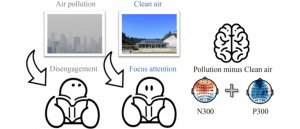New study reveals air pollution's distracting effect on attention, unveiling underlying neurocognitive mechanisms
USA, January 25, 2024 /EINPresswire.com/ -- A groundbreaking study has uncovered how air pollution distracts attention, emphasizing the neurocognitive processes involved. This research, employing event-related potentials (ERPs) and behavioral measures, demonstrates that exposure to air pollution visually impairs attentional allocation and task performance, contrasting with the attention-capturing effects of clean air.
Air pollution, a major global health risk, is known for its detrimental physical effects, but its impact on cognitive functions like learning and driving has only recently been explored. Prior studies have indicated that exposure to air pollution can impair cognitive performance, behavior, and productivity, but the underlying neurocognitive mechanisms remained largely unexplored until now.
In a new study (https://doi.org/10.1007/s11783-024-1801-x) published on 10 December 2023, in the journal Frontiers of Environmental Science & Engineering, a research team from Nanjing University utilized an adapted dot-probe task paradigm and the ERP technique to investigate how visual stimuli of air pollution influence attention allocation. Participants were shown cues (either pollution or clean air images) before responding to targets in either the same or opposite visual field. Behavioral measures indicated that pollution images resulted in higher response accuracy in trials requiring attention shifts. ERP analysis showed that pollution images evoked lower N300 amplitudes, suggesting less attention-capturing effects, while these cues correlated with higher P300 amplitudes in attention-holding trials, indicating the need for more cognitive resources to maintain attention.
"Air pollution not only poses a significant threat to physical health but also impacts cognitive functions in a subtle yet profound manner," explains the study's lead researcher. "Our findings offer the first neuroscientific evidence of how air pollution distracts our attention, emphasizing the need for clean air initiatives to enhance cognitive wellbeing."
The study concludes that visual exposure to air pollution distracts attention and impacts task performance, with pollution cues resulting in lower accuracy in attention-holding trials but higher in shifting trials. Clean air captures more attention, as indicated by larger N300 amplitudes. These findings highlight the neurocognitive impact of air pollution, bridging environmental science and social cognitive neuroscience. The study urges attention to this phenomenon, particularly in developing countries.
DOI
10.1007/s11783-024-1801-x
Original Source URL
https://doi.org/10.1007/s11783-024-1801-x
Funding information
The study was financially supported by the National Natural Science Foundation of China (Nos. 71921003 and 72222012), the Jiangsu R&D Special Fund for Carbon Peaking and Carbon Neutrality (No. BK20220014), the Jiangsu Natural Science Foundation (No. BK20220125).
Lucy Wang
BioDesign Research
email us here
Legal Disclaimer:
EIN Presswire provides this news content "as is" without warranty of any kind. We do not accept any responsibility or liability for the accuracy, content, images, videos, licenses, completeness, legality, or reliability of the information contained in this article. If you have any complaints or copyright issues related to this article, kindly contact the author above.


